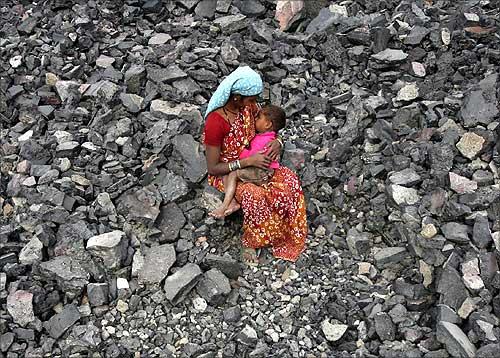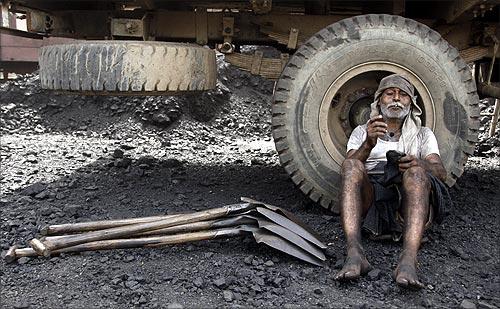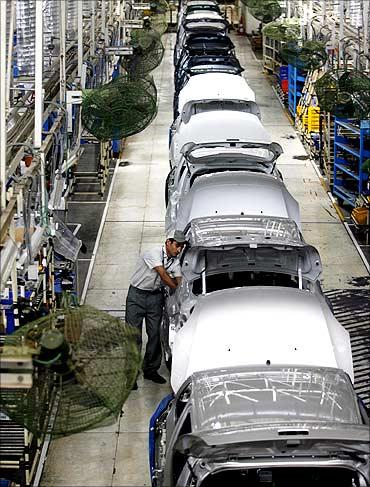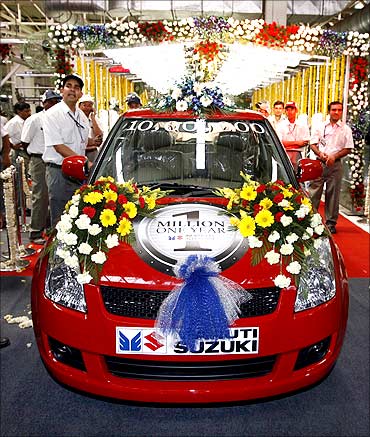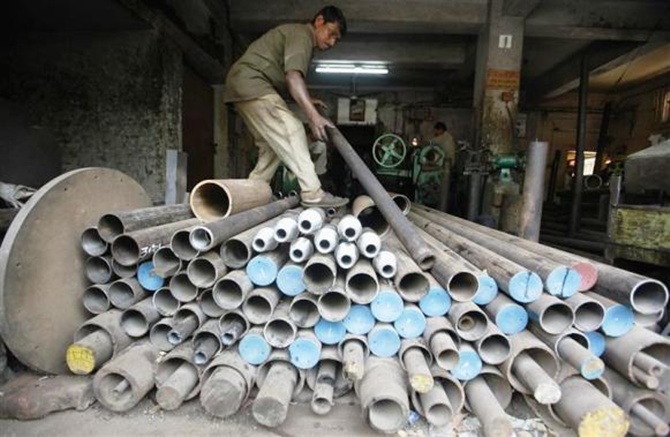 | « Back to article | Print this article |
Manufacturing sector sees second-worst period since 1950
Just as the scandals of UPA-I ruined UPA-II, the corporate overreach and governance failures of the go-go years are now extracting a terrible price, says T N Ninan.
The industrial production index was 170.3 in 2011-12. Two years later, the index for the first 11 months of 2013-14 stands fractionally lower, at 170.0.
If we go by the index, we have had zero industrial growth compared to two years ago.
The manufacturing sub-sector of "industry" has seen zero growth or a fall in output in 15 of the last 24 months, and less than three per cent growth in seven more months.
In only two of these 24 months did output growth cross three per cent.
Click NEXT to read more…
Manufacturing sector sees second-worst period since 1950
In a second sub-sector, mining, the index has dropped to a level (126.3 in February) lower than the 130.5 that it was four years earlier, in February 2010.
The index is not the most reliable barometer, as there are questions about the accuracy of its data.
Without getting into this, and the difference between output and value addition, manufacturing growth was low at 2.7 per cent in 2011-12, lower at 1.2 per cent in 2012-13, and non-existent or negative in 2013-14.
These numbers are subject to revision, probably upward; still, the annual average manufacturing growth of 2011-14 may make these three years the second-worst period since 1950.
Click NEXT to read more…
Manufacturing sector sees second-worst period since 1950
The only worse period was 1970-75 when industrial growth as a whole averaged a bare 1.8 per cent for five long years. Focusing on low GDP growth in recent years, therefore, masks the deeper crisis facing manufacturing and mining.
The government has tried many things. It announced a policy on special economic zones, and it came out with a grand manufacturing policy. It has offered tax cuts in the hope of stimulating demand.
It also announced a scheme for preference being given to local manufacture over imports, along with government subsidies.
Click NEXT to read more…
Manufacturing sector sees second-worst period since 1950
But most of the special economic zones have been non-starters; tax cuts have not helped automobiles, which continue to face falling sales; local preference has been severely circumscribed following international criticism; and most people won't be able to tell you what the manufacturing policy says.
Its stated goal of taking manufacturing from some 16 per cent of GDP to 25 per cent sounds like a bad joke.
According to one expert, employment in manufacturing as a percentage of total employment peaked nearly a decade ago, and has fallen since - the opposite of what the manufacturing policy seeks.
Click NEXT to read more…
Manufacturing sector sees second-worst period since 1950
As for mining, the coal and iron ore scandals have done damage that can be undone only slowly, it would seem.
Perhaps the attempted solutions miss the point, and the real issues lie elsewhere. Indian manufacturers are unable to grow exports, which too have been stagnant for a couple of years.
Then come all the governance issues: delays in regulatory approvals, disputes over public-private partnership projects for building infrastructure, excessive borrowing by companies and individuals, retrospective tax disputes with outsize sums being claimed, and banks that are short of capital but don't know how to get it.
Click NEXT to read more…
Manufacturing sector sees second-worst period since 1950
Solutions are possible but will be messy and slow, given a federal system, independent regulators, judicial review, legislative gridlock and the time it takes to get over financial indigestion.
Importantly, almost none of this has to do with the state of the world. Global economic growth was averaging about four per cent in the boom years before the financial crisis of 2008.
In the last three years, that average has slipped to about three per cent.
In comparison, India's economic growth has more than halved, and industrial growth plummeted from an average of 11 per cent in 2004-08 to two per cent or thereabouts in the last two or three years.
Just as the scandals of UPA-I ruined UPA-II, the corporate overreach and governance failures of the go-go years are now extracting a terrible price.

